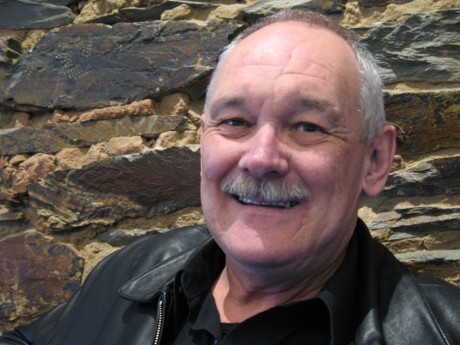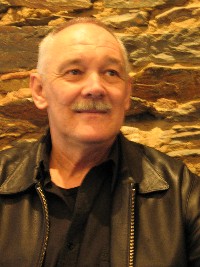20.08.07

The Uranian Society was always meant to be more than a social club, we meant it to be a cultural club which gay guys came to once a month.
We get all sort of jokes about the name, as you might imagine...it's acutally borrowed from the Uranian poets, who get their name form Plato's discussion of the Greek muses: Uranus was the muse for gay life. As you can probably work out, I was a secondary school English teacher.
I was a founding member of the Uranian Society in 1989.South Australia then was politically and socially the most conservative of all the states.
 It's a total hypocrisy. When South Australia was established, it wasn't a convict settlement like the other states; it had a system of purchasing land for free settlers. Within the first few years of settlement an establishment had formed, which is still very influential today. It's a facade: Adelaide may be called the City of Churches, but there have always been as many pubs. The mix of sex scandals and politics is very potent here.
It's a total hypocrisy. When South Australia was established, it wasn't a convict settlement like the other states; it had a system of purchasing land for free settlers. Within the first few years of settlement an establishment had formed, which is still very influential today. It's a facade: Adelaide may be called the City of Churches, but there have always been as many pubs. The mix of sex scandals and politics is very potent here.
In 1970 a left-leaning man called Don Dunstan became premier, which started a new era of reform after 25 years of conservative government. He was a relatively young man, he was also the Arts minister, and he was always rumoured to be gay, later confirmed. His reforms spanned Aboriginal land rights to decriminalising homosexuality. Decriminalisation in 1975 made South Australia the first state to do so by a long shot.
In the following few years I was in my 20s and 30s - and the beginnings of a gay community were establishing. A similar thing started happening all over Australia. We had a Pride group, a social committee and other things going on.
Then of course in the early 80s AIDS came along. Everything took a nosedive - the fundamentalist churches called it God's punishment; the conservative media blamed it on promiscuity. It's true that at least on one level the gay men's culture was a sexual culture, a result of years of repression.
It was then, really in 1986, after I'd started losing a lot of friends to AIDS that I thought "that could have been me" and stopped fulltime teaching to join the AIDS council and enter politics.
I've gradually ended up being involved in many groups and, as my hair has greyed, being called 'the Godfather of the gay community'.
One night at a drop-in group for gay men we were talking about how there didn't seem to be a community as in the 1970s. The community had been shattered by AIDS; people just stayed at home.
We formed a group called Gay Community Action (GCA). It tried to be all things to all people. It ran for 10 years and did a lot - we tried to run events to bring people together, like Stonewall Week in June, dances, community picnics.The GCA group and later other groups like the Uranian Society helped rebuild the gay community.
If you look in the back of the local gay paper, blaze, you'll see that there are more than a hundred groups for gay men.
A major development over the last ten years has been Feast: a four week festival in November, with events all year too. Short film festivals, First Queers, forums - Adelaide loves forums! - quiz nights, a parade. It has absorbed many of the events previously run by GCA.
But there's always been a gap - we've got plenty of groups for older gay men and the Young & Gay program. That's why the Uranian Society exists. I think if you asked around, people would say 'Oh, that's the society of stuffy academics and teachers' - but that's a joke because it was always about pop culture.
 I can't imagine the early gay rights movement advocating gay marriage - 'why would we copy that,' we thought, 'we don't want to succumb to the conservative ideal' - and now we're pushing for equal marriage rights.
I can't imagine the early gay rights movement advocating gay marriage - 'why would we copy that,' we thought, 'we don't want to succumb to the conservative ideal' - and now we're pushing for equal marriage rights.
There's been a gentrification of gay activists. Early on in the 1970s it was like a revolution. We were going to smash the establishment. It didn't last long but it was important as it brought together a lot of young radicals.
By 1975 we had to start engaging with the wider community. The way to make change was to work within the established framework. The reality in 2000 when we started the Let's Get Equal campaign [for equal same-sex relationship rights in South Australia] we needed to spend the first period consulting the community on what they wanted. People wanted partner recognition under the law: they didn't want to have to fight hospitals for recognition as next of kin, basic things like that.
To effect change we haven't held and demanded. We've had to accept that we live in a wider community. Here in Adelaide the Labour Catholic Right is very strong, and tried every trick in the book behind the scenes to hold things up. We're in a much more conservative era now - if you'd told me in the 1970s this is what it would be like in 2007, I wouldn't have believed you.
There's a balance between maintaining your rage and working with the government. We didn't amnage to get IVF and adoption equality, which disappointed many people. If we had held out there was a good chance we'd have got nothing at all.
However, on the 1st of June this year, the Statues Amendment (Domestic Partners) Bill comes into effect. It gives legal recognition of same-sex couples under State law [Marriage is a Federal issue - Nick].
I have a sense of passing on the history. If you don't know what happened in the past, it can be repeated. Two examples are the Reichstag in the 1920s, and more recently the new government in Canada trying to wind back gay rights legislation enacted by the previous government.
Just because we've got these rights now doesn't mean that they can't be taken away.
 Ian talked to me on Friday, July 20, 2007.
Ian talked to me on Friday, July 20, 2007.
Enjoyed reading? Consider supporting future entries with a donation.
Copyright © 2007 Nick McIntosh. All rights reserved.
All web design, web construction, interviews and photography by Nick McIntosh
